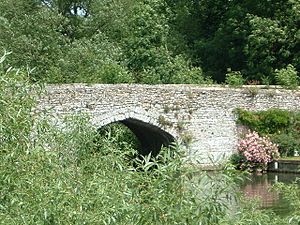Culham Bridge facts for kids
Quick facts for kids Culham Bridge |
|
|---|---|

Old Culham Bridge
|
|
| Coordinates | 51°39′30″N 1°16′38″W / 51.6584°N 1.2772°W |
| Carries | Thames Path |
| Crosses | Swift Ditch |
| Locale | Abingdon, Oxfordshire |
| Maintained by | Oxfordshire County Council |
| Characteristics | |
| Design | Arch bridge |
| Material | stone |
| Number of spans | Five |
| History | |
| Construction end | 1422 |
| Closed | 1927 |
The Culham Bridge is a very old stone bridge in England. It crosses a small channel of the River Thames called Swift Ditch. This is near the town of Abingdon in Oxfordshire.
Swift Ditch used to be the main way boats traveled on the River Thames. This was true until a new lock, called Abingdon Lock, was built in 1790. The bridge once carried the A415 road for cars and trucks. This road went from Abingdon to Dorchester. However, a new, modern road bridge was built in 1928. Now, Culham Bridge is mainly used by people walking.
Culham Bridge is a Grade II* listed building. This means it is a very important historic building. It is protected by law because of its special history and design.
Contents
History of Culham Bridge
Building the Bridge
Culham Bridge was built from stone between 1416 and 1422. It replaced an old river crossing called Culham Hythe. A religious group known as The Brotherhood of Christ built it. This group later became Christ's Hospital. They were also in charge of keeping the bridge in good repair.
The bridge was part of a bigger plan to improve travel. This plan also included building two bridges at Abingdon. It also added a raised path across Andersey Island. When the Abingdon Bridge was finished, it caused problems for businesses in Wallingford.
River Travel and Changes
In the early 1600s, a group called the Oxford-Burcot Commission built a lock. This lock was at the top of Swift Ditch. A lock is like a water elevator for boats. It helps boats move between different water levels. This lock made sure boats traveled under Culham Bridge. This was the main route on the Thames until 1790. That's when Abingdon Lock was built.
The English Civil War
The bridge was very important during the English Civil War. This war was fought in England from 1642 to 1651. It was between the King's supporters (called Royalists) and Parliament's supporters (called Parliamentarians).
In May 1644, the Royalists left Abingdon. The Parliamentarians then took control of Culham Bridge. They used it to attack the Royalists' food supplies going to Oxford. In January 1645, the Royalists tried to get the bridge back. They also wanted to destroy it.
This led to a small battle on January 11, 1645. It is known as the Battle of Culham Bridge. During this fight, Sir Henry Gage was a Royalist leader. He was bravely leading his soldiers in an attack. Sadly, he was hit by a bullet and died.
Modern Times
By the 1700s, the road over the bridge was in very bad condition. So, a new law was passed to improve it. The bridge carried most of the traffic until 1928. That's when a new road bridge was built nearby. After that, Culham Bridge became a bridge just for people walking.
During World War II, two concrete "pill boxes" were built on the bridge. These were small, strong shelters for soldiers. Each one weighed 250 tons and held anti-tank guns. Part of the bridge's low wall (called a parapet) was removed. This made space for a concrete platform. After the war, the bridge was fixed. It is now classified as an ancient monument. This means it is a very old and important historic site.
Images for kids
See also
- Crossings of the River Thames
- Sutton Bridge, Oxfordshire







